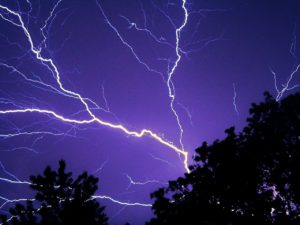 A while ago I wrote an article about the storms or tormentas which are caught within the mountain range to the east of Jerez and which would feature in my next book. While I haven’t been up into the mountains recently I have experienced the truly awe-inspiring storms, often coming in off the Atlantic and across the Bay ( see Cadiz in the Rain ).
A while ago I wrote an article about the storms or tormentas which are caught within the mountain range to the east of Jerez and which would feature in my next book. While I haven’t been up into the mountains recently I have experienced the truly awe-inspiring storms, often coming in off the Atlantic and across the Bay ( see Cadiz in the Rain ).
Only earlier this week the tempest was thundering ( to the dismay of my neighbour’s dog, whose name happens to be Relampago, or Lightning ). The sky was a patchwork eiderdown of black and deepest grey, and during daylight hours the light was brown. Outlines of buildings, trees and road furniture blurred, seen, if seen at all, through a moving curtain of water. This wasn’t English rain, which occasionally pours but is usually a sort of heavy drizzle, this was closer to tropical rain.
A friend was out driving, going around a traffic roundabout, 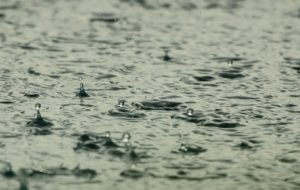 when she just had to stop. She couldn’t see where she was going, the windscreen wipers couldn’t disperse the water fast enough. When the flood diminished there were other cars, mid-road, their drivers having done the same. This is sensible – there were seventy-nine road accidents caused by the rain in just one day last weekend.
when she just had to stop. She couldn’t see where she was going, the windscreen wipers couldn’t disperse the water fast enough. When the flood diminished there were other cars, mid-road, their drivers having done the same. This is sensible – there were seventy-nine road accidents caused by the rain in just one day last weekend.
Jerez is a city where so much life is lived outside that it is strange to see the squares and roads empty of people when they should be busy. But the atmosphere and the rain was very useful for my writing, I have got to the point where the characters are up in the mountains, so describing the storm and the wet was occupying quite a lot of my mind.
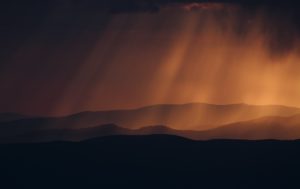 ‘Tormentas‘ is such an evocative word, of torment in the sky, but there are British dialect words for rain or raining which are equally interesting. I have always loved the Scottish ‘dreich‘, meaning rainy, cloudy, dark and English dialect words for different types of raining include ‘plothering‘, ‘luttering‘ and ‘siling‘.
‘Tormentas‘ is such an evocative word, of torment in the sky, but there are British dialect words for rain or raining which are equally interesting. I have always loved the Scottish ‘dreich‘, meaning rainy, cloudy, dark and English dialect words for different types of raining include ‘plothering‘, ‘luttering‘ and ‘siling‘.
The writer Robert Macfarlane has collected many ‘old’ words describing the countryside, including the weather, in his book ‘Landmarks‘, including the lovely ‘smirr‘ meaning very fine, misty rain which resembles smoke when seen from a distance and the Irish ‘clagernach‘ meaning the sound of heavy rain clattering on to an iron roof. He quotes from one of my favourite poets of nature, Gerald Manley Hopkins, with his ‘heavengravel‘ for hail and ‘wind-puff bonnet of fawn froth‘* for the watery spume of waterfalls.
I began to think about prose descriptions of rain. How have other writers done it? In ‘The God of Small 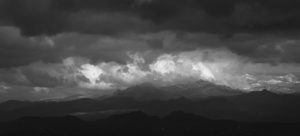 Things‘ Arundhati Roy writes some wonderful descriptions of monsoon-type rain. Here’s one such.
Things‘ Arundhati Roy writes some wonderful descriptions of monsoon-type rain. Here’s one such.
“Heaven opened and the water hammered down, reviving the reluctant old well, greenmossing the pigless pigsty, carpet bombing still, tea-colored puddles the way memory bombs still, tea-colored minds.”
But there are plenty of others, here’s one British rural and one U.S. urban.
 “At that instant a dazzling claw of lightning streaked down the length of the sky. The hedge and the distant trees seemed to leap forward in the brilliance of the flash. Immediately upon it came the thunder: a high, tearing noise, as though some huge thing were being ripped to pieces close above, which deepened and turned to enormous blows of dissolution. Then the rain fell like a waterfall. In a few seconds the ground was covered with water and over it, to a height of inches, rose a haze formed of a myriad minute splashes.” Richard Adams. Watership Down
“At that instant a dazzling claw of lightning streaked down the length of the sky. The hedge and the distant trees seemed to leap forward in the brilliance of the flash. Immediately upon it came the thunder: a high, tearing noise, as though some huge thing were being ripped to pieces close above, which deepened and turned to enormous blows of dissolution. Then the rain fell like a waterfall. In a few seconds the ground was covered with water and over it, to a height of inches, rose a haze formed of a myriad minute splashes.” Richard Adams. Watership Down
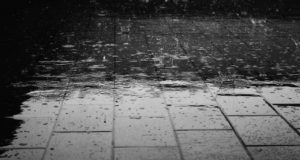 “The air became grey and opalescent; a solitary light suddenly outlined a window over the way; then other light; then a hundred more danced and glimmered into vision. Under his feet a thick, iron-studded skylight turned yellow; in the street the lamps of the taxicabs sent out glistening sheens along the already black pavement. The unwelcome November rain had perversely stolen the day’s last hour and pawned it with that ancient fence, the night.” F.Scott Fitzgerald, This Side of Paradise
“The air became grey and opalescent; a solitary light suddenly outlined a window over the way; then other light; then a hundred more danced and glimmered into vision. Under his feet a thick, iron-studded skylight turned yellow; in the street the lamps of the taxicabs sent out glistening sheens along the already black pavement. The unwelcome November rain had perversely stolen the day’s last hour and pawned it with that ancient fence, the night.” F.Scott Fitzgerald, This Side of Paradise
You’ll be able to see how successful, or otherwise, I am when the book is finally published. In the meanwhile I am planning my trip up into the mountains themselves.
*From ‘Inversnaid‘
If you enjoyed reading this article you might also enjoy Plotting Characters Once More with Feeling In the High Sierras


 RSS – Posts
RSS – Posts